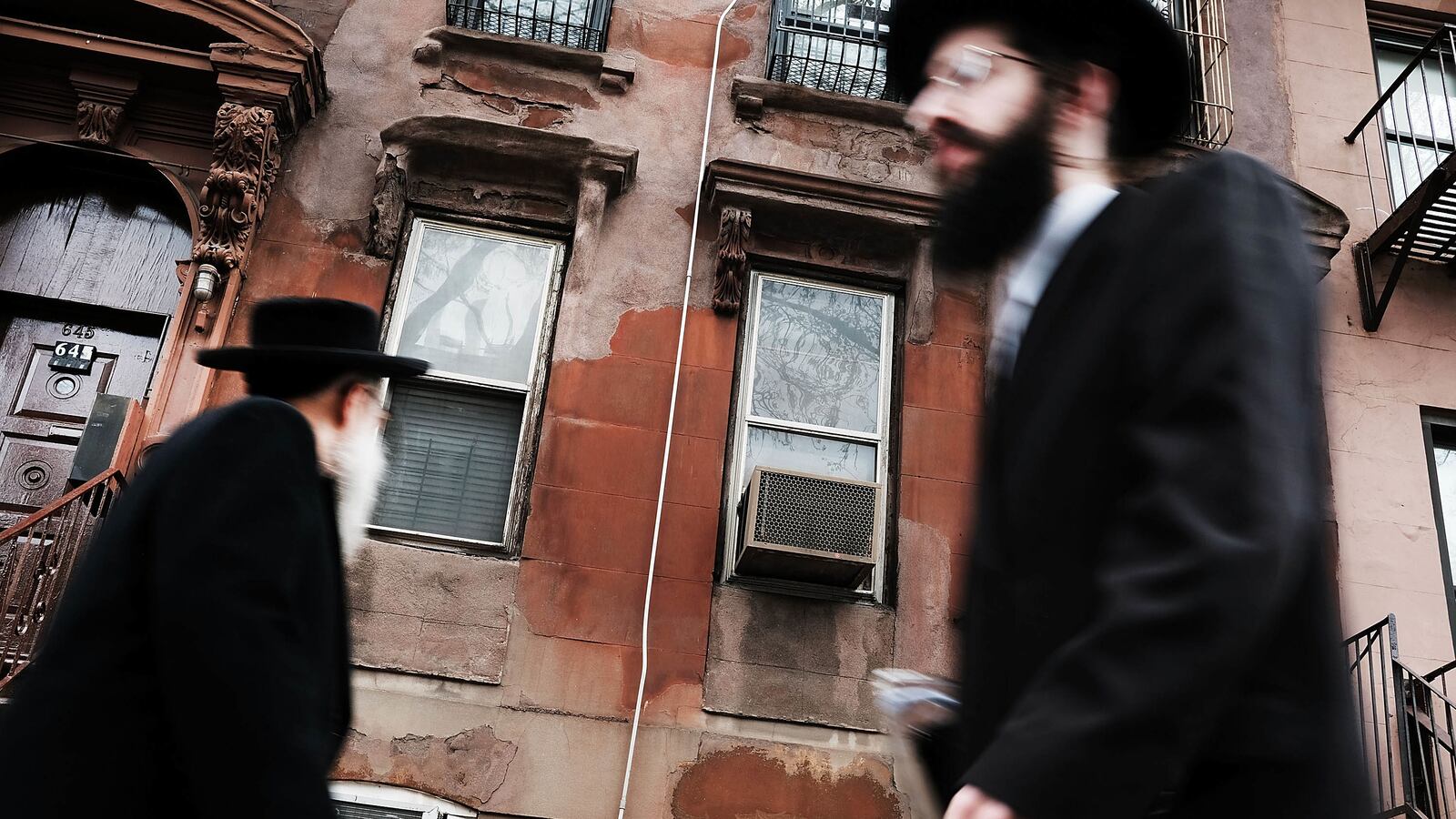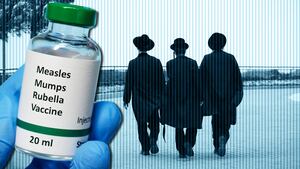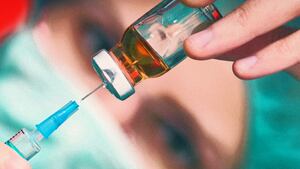Miriam thought her niece was safe from measles.
At five months old, the baby girl was too young for the first of the two MMR (measles, mumps and rubella) vaccines recommended by the CDC. Miriam (who asked that her last name not be shared in order to protect her family’s privacy) knew about the measles outbreak that had plagued her community, a Hasidic enclave in Williamsburg, Brooklyn, since last fall.
Since December, however, religious day schools in the area had been ordered by New York’s Department of Health to bar unvaccinated students from attending in an effort to keep the outbreak under control. Miriam and her sister assumed the five-month-old would be safe at her daycare, which shares space with a school.
They were wrong. Within days, the baby came down with a fever. By Sunday, the baby had a head-to-toe rash. For most of last week, she had a hacking cough, a runny nose, and other flu-like symptoms.
“You feel really helpless when a five-month-old is sick,” Miriam said. “That’s why it was so scary.”
Miriam’s niece was not the only child affected. Last Thursday, the Department of Health identified 25 more cases of measles in the borough’s Orthodox Jewish community; the total number of cases now stands at 158 since the outbreak began in October.
And while many religious day schools, called yeshivas, are believed to be complying with the Health Department’s rules on unvaccinated students, at least six have not. One of them, Yeshiva Kehilath Yakov Pupa in Williamsburg, is linked to at least 42 cases of measles after allowing an unvaccinated student with measles to attend classes, according to a Health Department statement (Yeshiva Kehilath Yakov Pupa is now complying with the Health Department’s rules, the New York Times reported earlier this month.)
The other five came under fire last Thursday for flouting the DOH and allowing unvaccinated children in.
“As the city’s doctor, and a pediatrician, I am very concerned that children without the measles vaccination are at unnecessary risk for serious, and potentially fatal, symptoms related to measles,” Health Commissioner Oxiris Barbot said in the statement. “The outbreak is not over, and we will continue to see additional cases as long as unvaccinated students are not properly excluded from attending school.”
The Health Department said Thursday that the five yeshivas needed to start barring unvaccinated students, or start receiving violations and fines.
The rise of anti-vaxxing may be partly to blame for the recent surge in measles cases. Last week, Gothamist reported that Hasidic parents were receiving anti-vaccine pamphlets and dialing into anti-vaccine conference calls organized by a group called Parents Educating and Advocating for Children’s Health, or PEACH.
While it’s unclear how many in Williamsburg have seen PEACH’s messaging, community members say they’ve heard anti-vaccine sentiments firsthand.
“People don’t think measles is a big deal,” Miriam said. “We didn’t know how bad it is.”
“What’s wrong with measles?” one mother, who declined to give her name, told The Daily Beast. “It’s a childhood disease. It passes you by.” She added that more and more mothers in the community were concerned about the negative effects of vaccines.
Community members and experts say that, while there is a subset of the population that isn’t vaccinating their kids based on misinformation about the dangers of vaccines, the majority of parents are in fact getting their kids vaccinated.
“I vaccinate my kids, and I’m for it,” said Molly, who asked that her last name not be used to protect her privacy. She said that vaccination was mandatory at her children’s small private school.
Sol Feuerwerker, a medical student who grew up in Williamsburg’s Hasidic community, said that while Hasidic parents don’t always receive as much science education as parents who attended secular schools, they’re far from distrustful of modern medicine.
“They’re very pro-healthcare and pro-medicine,” he said. “They’re genuinely seeking the highest quality of care for their families and communities.”
Rabbi Asher Bush, who has written extensively on vaccinations and Jewish law, said that he sees the the anti-vaccine sentiment as unconnected to Hasidic Jews’ faith.
“This is not a religious issue,” he said, adding that there are anti-vaxxers in secular communities all over the world.
The experts agreed, though, that the setup of Williamsburg’s Hasidic community could make it more susceptible to outbreaks. Community members tend to have large families, and children play, learn, and socialize in close quarters. Some Hasidic Jews also make trips to Israel, which is experiencing a measles outbreak of its own.
Add to that measles’ extraordinary contagiousness—according to the CDC, one infected person can infect up to 90 percent of the susceptible people they come into contact with—and you have what Feuerwerker called “a perfect storm.”
Frieda Vizel, who grew up Hasidic and now leads tours of the Williamsburg enclave for curious travelers, said that very few doctors come from within the Hasidic community.
“It’s hard to differentiate between the fringe and real science without anyone in your world to help guide you,” she said. “You have to take the experts’ word for it.”
Health officials and providers realize this, and they’re working closely with community groups to spread the word about vaccination. The Department of Health worked with Chevra Hatzalah, the Jewish volunteer ambulance corps, to place notices in Jewish newspapers urging parents to vaccinate their children. Local pediatricians have created separate waiting rooms for measles patients, and have added signage and voicemail messages instructing parents to alert staff before bringing in contagious kids.
“People are taking it more seriously now,” said Beatrice Delgado of Williamsburg Pediatrics, a provider that serves the neighborhood’s Hasidic community.
Jay Begun, founder of Kindercare Pediatrics in Williamsburg and an instructor in the Department of Pediatrics at Mount Sinai, said that his practice only takes potential measles patients after business hours to reduce the risk of spreading the infection. According to the CDC, measles can live in a room for up to two hours after the infected person leaves. Dr. Begun added that he and other local pediatricians have also started giving MMR vaccines on an accelerated schedule.
Rabbi David Niederman, of the United Jewish Organizations of Williamsburg and North Brooklyn, says his group is giving parents Yiddish language presentations on the importance of MMR vaccination.
“We do the public dissemination as a trusted voice, in their own language,” Niederman said. “The government knows that we have an open door, and the community knows that we will not lead them the wrong way, so they listen to us.”
Niederman also said that UJO is facilitating meetings with yeshivas to help bring them into compliance with the DOH’s orders.
The yeshivas named in the DOH statement all either declined to comment or did not return requests for comment. At the time of writing, the Department of Health also hadn’t returned requests for comment.
Miriam’s niece is recovering, Miriam said, and since everyone else in the family is vaccinated, the illness hasn’t spread further. As for her own kids, Miriam took her youngest to get vaccinated as soon as she reached the 6-month mark—the minimum age for the early, extra dose of the MMR vaccine recommended for Orthodox Jewish community members in late February.
“That was her birthday present,” she said.








